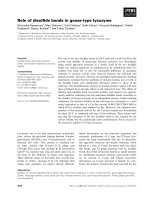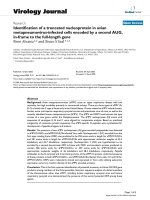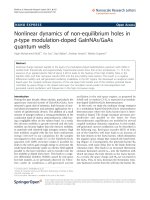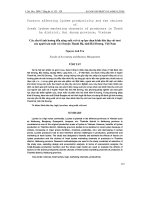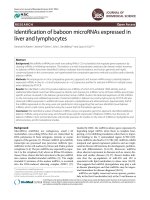Identification of fresh seed dormancy in bunch type groundnut genotypes (Arachis hypogaea L.)
Bạn đang xem bản rút gọn của tài liệu. Xem và tải ngay bản đầy đủ của tài liệu tại đây (238.65 KB, 5 trang )
Int.J.Curr.Microbiol.App.Sci (2019) 8(10): 568-572
International Journal of Current Microbiology and Applied Sciences
ISSN: 2319-7706 Volume 8 Number 10 (2019)
Journal homepage:
Original Research Article
/>
Identification of Fresh Seed Dormancy in Bunch Type Groundnut
Genotypes (Arachis hypogaea L.)
Anil Kulheri* and R. S. Sikarwar
Department of Genetics and Plant Breeding, Rajmata Vijayaraje Scindia Krishi Vishwa
Vidyalaya, Gwalior (M.P.), India
*Corresponding author
ABSTRACT
Keywords
Fresh seed
dormancy,
Groundnut and
Genetic variation
Article Info
Accepted:
07 September 2019
Available Online:
10 October 2019
Fresh seed dormancy in bunch type groundnut has a significant influence
on pod yield, oil and protein quality. It is required to avoid economic loss
in the form of in-situ germination during unpredictable rainfall at maturity.
A study was carried out using 32 bunch type groundnut genotypes and 5
groundnut cultivars to identify fresh seed dormant genotypes. Analysis of
variance revealed that significant genotypic differences for germination
percent. Character Association studies showed that significant correlation
coefficients between duration of fresh seed dormancy and intensity of fresh
seed dormancy. The result observed that five groundnut genotypes viz., TG26, ICGV-13558, ICGV-13214, ICGV-13237, ICGV-8110 had more than
four weeks duration of fresh seed dormancy and highest intensity of fresh
seed dormancy during 2018 season. Therefore, these genotypes were
identified as new sources of fresh seed dormancy and could be used as
donor parent in breeding programme to develop high yielding bunch type
cultivars with 2-3 week fresh seed dormancy in groundnut.
Introduction
Groundnut is a species of the legume family
Fabaceae which comprises important edible
oil seed crops in the world. Groundnut is
classified into two subspecies based on
morphological characteristics (Kaprovickas
and Gregory, 1994). Sub-species fastigiata
var. Vulgaris, is a short season crop,
sequential branching habit and are generally
without seed dormancy. sub-species var.
hypogaea, have longer life cycle and alternate
branching habit with seed dormancy.
Spanish types are grown predominantly in
semi-arid regions of Asia and Africa, where
growing season is short. The primary
advantages of Spanish types are their short
568
Int.J.Curr.Microbiol.App.Sci (2019) 8(10): 568-572
growing season and bunch-type growth habit
usually mature within 90 to 120 days after
sowing, whereas most Virginia type cultivars
take 120 days or more to mature.
The erect bunch cultivars of ssp.fastigiata are
popular in the short growing conditions
because of their early maturity and easy
harvesting.
Yield losses due to in situ germination in erect
bunch varieties have been estimated to range
between 20% and 40% (Reddy et al., 1985;
Nagajun and Radder, 1983). Thus, a short
period of seed dormancy is necessary to
reduce these losses.
Seed dormancy has been defined as the failure
of an intact, viable seed to complete
germination under favourable conditions
(Bewley, 1997). Appreciable dormancy
observed in the freshly harvested seeds of
several bunch groundnut cultivars is called
fresh seed dormany.
In groundnut, seed dormancy has been
reported to be controlled by two hormones:
abscisic acid which inhibits sprouting and
ethylene which is accumulated in storage to
break dormancy to allow germination (Ketring
and Morgan, 1971, 1972).
In India groundnut is cultivated in rainy
season and prolonged seed dormancy is an
undesirable character; however, a short period
(10-20 days) fresh seed dormancy is required
in the Spanish type of groundnut to prevent in
situ seed germination in the field due to
unseasonal rains at the time of maturity.
The objectives of this study were to evaluate
bunch type groundnut genotypes for
germination percent, intensity, duration of
fresh seed dormancy and to study genetic
variability in genotypes for fresh seed
dormancy.
Materials and Methods
Plant material and field experiment
The experimental material consisted of 32
bunch type groundnut genotypes and 5
cultivars of groundnut viz. TG-26, Grinar-2,
Grinar-3, Mallika and JGN-3. These
genotypes were harvested at maturity.
To study fresh seed dormancy, a sample of
mature pods was randomly collected and
shelled immediately from each genotype.
Enough care was taken to prevent any damage
of the seed testa, cotyledons and embryo while
removing seeds from pods.
A total 32 bunch type groundnut genotypes
and five cultivars were evaluated during
summer 2018 at Research Farm, Department
of Genetics and Plant Breeding, RVSKVV,
College of Agriculture, Gwalior (M.P.) (260
13’ N Latitude and 780 14’ E Longitude) in
sandy loam soil. The experiment was laid out
in randomized complete block design with
three replications.
Each replication consisted of 20 fresh
harvested seeds sown at 2 to 3cm deep for
each genotype. The seeds of each genotype
were sown at 45 cm spacing between rows and
10 cm between plants.
The soil moisture was maintained at field
capacity during the growth period of the test
(30 DAS) by irrigation. The observations were
recorded on number of seeds germinated at
every day until the end of experiment.
Estimated parameters
Fresh seed dormancy is characterized by its
intensity and duration. Fresh seed dormancy
parameters were estimated using the method
suggested by Kumar et al., (1991).
569
Int.J.Curr.Microbiol.App.Sci (2019) 8(10): 568-572
Germination percentage
The percentage of germinated seeds for entry
at a given date were calculated by the
following formula:
was observed in the genotypes TG-26,ICGV8110,ICGV-13237,ICGV-13214,ICGV13565,ICGV-13574,ICGV-13558 and ICGV13564 while highest germination percent was
observed in genotypes ICGV-13564, ICGVX-1400-65-F2, JGN-3 and ICGV-13229.
Intensity of fresh seed dormancy
Intensity of dormancy (%)
= 100- Germination percentage
Intensity of dormancy ranged from 4.2 to
100%. The highest (100%) intensity of
dormancy was recorded in ICGV-13567,
ICGV-13558, ICGV-13214, ICGV-13237,
ICGV-8110 and TG-26 genotypes. While the
lowest have recorded in ICGV-13564 (4.2%),
ICGV-X-140065-F2(4.5%) and JGN-3 (5.9%).
This large variation could be due to genetic
variation among the genotypes.
Duration of fresh seed dormancy
Duration of fresh seed dormancy
Duration of dormancy was measured by days
taken to attend 50 per cent germination by a
genotype.
Genotypes tested showed different durations
of dormancy and it ranged from 7 to >35 days.
Genotypes TG-26 had highest >35 days
duration of dormancy followed by ICGV13574, ICGV-13558, ICGV-13555, ICGV8705, ICGV-13565, ICGV-13208, ICGV13214, ICGV-9885, ICGV-13230, ICGV13233, ICGV-13237, ICGV-8110, Girnar -3
and Girnar-2 had >28 days duration of
dormancy.
Intensity of fresh seed dormancy
The intensity of dormancy was measured as
percentage of non-germinated seed at seven
days after sowing.
Results and Discussion
Analysis of variance revealed that significant
genotypic differences for germination (Table
1). Germination percentage of genotypes
averaged over is presented in Table 2. At 14th
days, an average lowest germination per cent
Table.1 ANOVA for germination percentage at seven days after sowing
Source of variation
Degree of
freedom
Sum of
squares
Mean sum of
squares
F value
Replication
1
8.38
8.38
19.41
Germination
percentage
Error
Total
37
62416.86
1733.80**
4017.23
37
74
15.54
62440.77
0.43
-
CV= 0.097%,
** significant at 1%
570
Int.J.Curr.Microbiol.App.Sci (2019) 8(10): 568-572
Table.2 Duration of dormancy, intensity of dormancy and mean value of germination percentage
in 37 groundnut genotypes
Genotypes
ICGV-13564
ICGV-13567
ICGV-X-1400-65-F2
ICGV- 13574
ICGV-13558
ICGV-13562
ICGV-13554
ICGV-13555
ICGV-13560
ICGV-13575
ICGV-13557
ICGV-8705
ICGV-13565
ICGV-13208
ICGV-13214
ICGV-9885
ICGV-13219
ICGV-13226
ICGV-13227
ICGV-13230
ICGV-13233
ICGV-13235
ICGV-13237
ICGV-13229
ICGV-13240
ICGV-8010
ICGV-13243
ICGV-13246
ICGV-8110
Grinar-3
Girnar-2
Mallika
ICGV-13545
PBS-12200
JGN-3
PBS-12201
TG-26
Mean Value of
germination
percentage (%)
95.8
0
95.5
0
0
3.6
2.2
1.8
59.5
8.6
17.2
2.2
0
0.8
0
2.4
7.8
19.97
10
1.5
0.6
29.6
0
92.4
6.94
17.96
19.1
15.3
0
0.67
1.92
21.78
24.4
27.3
94.1
17.6
0
571
Duration of
dormancy(days)
Intensity of
dormancy(%)
7
28
7
>28
>28
28
>28
>28
10
28
21
>28
>28
>28
>28
>28
28
21
28
>28
>28
10
>28
7
28
21
21
21
>28
>28
>28
14
10
10
7
14
>28
4.2
100
4.5
100
100
96.5
97.8
98.2
40.5
90.4
82.9
97.8
100
99.2
100
97.6
92.2
80.03
90
98.5
99.4
70.4
100
7.6
93.06
82.04
80.9
84.7
100
99.33
98.08
78.22
75.6
66.7
5.9
82.4
100
Int.J.Curr.Microbiol.App.Sci (2019) 8(10): 568-572
In contrast, non-dormant genotypes such as
ICGV-13564 and JGN-3 had lowest 7 days
dormancy duration. It was also observed that
intensity and duration of dormancy had
significant correlation; it means more the
intensity of duration longer was the duration
of dormancy. Bunch type groundnut
genotypes and cultivars evaluated for fresh
seed dormancy showed significant genetic
variation for germination percent, duration and
intensity of fresh seed dormancy in groundnut.
It was concluded that five groundnut
genotypes viz., TG-26, ICGV-13558, ICGV13214, ICGV-13237, ICGV-8110 had more
than four weeks duration of fresh seed
dormancy and highest intensity of fresh seed
dormancy.
Therefore, these genotypes were identified as
new sources of fresh seed dormancy in
groundnut.
Acknowledgements
The authors are grateful to Head Of
Department for providing facilities and
support for carrying out the research
experiment.
References
Asibuo James Yaw et al., (2008). Inheritance of
fresh seed dormancy in groundnut. African
Journal of Biotechnology Vol. 7 (4):421424.
Bewley JD (1997). Seed Germination and
Dormancy: Plant Cell. 91055-1066.
Faye I.Fonceka, Francois D. Ramijean, Nodye
Sau Mbaye, Diop A. T. and Nody
O.(2010). Inheritance of fresh seed
dormancy in Spanish type peanut (Arachis
hypogaea L.) bias introduced by
inadvertent selfed flowers as revealed by
microsatellite markers control. African J.
Biotchon., 9 (13):1905-1910.
Kaprovickas A, Gregory WC (1994).
Taxonamia
del
genero
Arachis
(Leguminosae). Bonpladia 8: 1-186.
Ketring DL, Morgan PW (1971). Physiology of
oilseed. II. Dormancy release in Virginiatype peanut seeds by plant growth
regulators. Plant Physiol. 47: 488-492.
Ketring DL, Morgan PW (1972). Physiology of
oilseed. IV. Role of endogenous ethylene
and inhibitory regulators during natural
and induced after ripening of dormant
Virginia-type peanut seeds. Plant Physiol.
50: 382-387.
Kumar A.S.T., Gowda M.V.C. and Nadaf H.L.
(1991). Seed dormancy in erect bunch
genotypes of groundnut (Arachis hypogaea
L.)I. Variability for intensity andduration.
Journal of Oilseeds Research, 8: 166-172.
Nagajun P, Radder GD (1983). Studies on
induction of seed dormancy in bunch types
groundnut. Seed Res. 11: 24-31.
Narendra kumar et al., (2018). Identification of
Spanish bunch advance breeding lines
having fresh seed dormancy in groundnut
(Arachis hypogaea L.). Progressive
Research an international journal volune
13 (1) : 19-23.
Reddy PS, Zade VR, Desmukh SN (1985). 1-19:
A new Spanish bunch groundnut cultivar
with fresh seed dormancy. J. Oilseed Res.
2: 103-106.
Nagajun P, Radder GD (1983). Studies on
induction of seed dormancy in bunch types
groundnut. Seed Res. 11: 24-31.
How to cite this article:
Anil kulheri and Sikarwar, R. S. 2019. Identification of Fresh Seed Dormancy in Bunch Type
Groundnut Genotypes (Arachis hypogaea L.). Int.J.Curr.Microbiol.App.Sci. 8(10): 568-572.
doi: />
572
